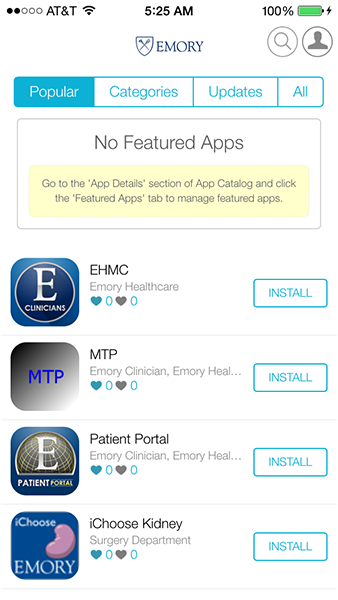
On June 29, Stephen Wheat, the Chief Information Technology Architect, will be hosting several presentations on the Emory Mobile App Catalog. Anyone in the Emory community can attend these presentations and see a demo of the service.
The sessions will be led by Emory IT Architecture and Apperian, the vendor whose mobile app distribution platform implements Emory’s Mobile App Catalog. The general session for all Emory people interested in mobile applications begins at 10:00 AM in the Goizueta Business School, Room 231.
The session will also be available as a webinar for those who cannot attend in person. Sessions for Information Security and LITS support teams will follow the general presentation. If you have a special interest in security and support topics and would like to attend those sessions, please contact Linda Richardson (lrichr [at] emory [dot] edu) to be added to the attendee list. You can learn more about the event at https://wiki.service.emory.edu/x/BqtrBQ.
The purpose of the Mobile App Catalog is to allow Emory to distribute and maintain its own mobility infrastructure without using a public marketplace. Neither Apple nor Google marketplaces are intended to support internal mobile app distribution for apps used only within an organization. Application in those marketplaces are available to the general public. Emory needed its own mobile infrastructure and the Mobile App Catalog serves that purpose.

The Emory Mobile App Catalog has been in production since October 2014, but with a limited license for use by 1000 users doing mobile app development, testing, and focus groups. Now Emory is licensed for all Emory University and Emory Healthcare people, and we can begin distributing mobile apps to large groups of users.
By using this catalog, Emory now knows what apps are in use. This allows teams to record data and perform analytics, an ability that is not available in the public marketplace. Also, the service gives Emory more access control to distribute apps to various groups, big or small.
Another added bonus of the Emory Mobile App Catalog is that it does not involve controlling the user’s device. Traditional mobile device management would take over a device but now users do not have to give up control of their own devices for installs. With the Catalog, Emory is performing “mobile application management,” which allows the removal and/or repair of problem apps without affecting the users.
Additionally, the Catalog can be used to distribute vended apps. This prevents the community from being blind-sided by vendor updates before they have been vetted by appropriate app support teams. The Emory Mobile App Catalog can also store curated entries for apps from the public market that have been deemed useful to Emory’s interests. Thus, rather than searching for an app to perform a needed task, these curated apps have already been reviewed and selected as the best for Emory’s environment. Curating in this fashion creates a registry of good apps that we can use.
Emory has approximately 22,000 mobile devices accessing its network, yet Emory only administers less than 200 of these devices. This means that the environment is 99% “bring your own device,” which required the enterprise to adopt a mobile application management solution. The Emory Mobile App Catalog is the answer.
For more information on the Emory Mobile App Catalog and Emory Mobile App Distribution, see the service Service Catalog Entry.
Leave a Reply